
The CAA fast-tracks Indian citizenship for Hindus, Sikhs, Buddhist, Christians, Parsis, and Jains who arrived in India before December 31, 2014, from its Muslim-majority neighbors, namely Pakistan, Bangladesh, and Afghanistan. By smoothing the path for all non-Muslim immigrants from adjoining countries to attain citizenship, the law paves the way for practitioners of Islam to be unfairly disadvantaged when seeking to immigrate to India.
Indian Prime Minister Narendra Modi has framed the CAA as a noble effort to welcome Hindus who are oppressed in neighboring Muslim-majority countries. During a recent rally in India’s capital, Modi said, “We passed this bill to help the persecuted.”
The anti-CAA protests are an unprecedented show of resistance against Modi’s BJP, and they come on the heels of several moves by the Indian government in recent months that seem designed to punish Muslims. In early August, the BJP amended the constitution to strip Kashmir, an embattled Muslim-majority region, of its autonomy. Then, in November, the Indian Supreme Court issued a ruling enabling the construction of a Hindu temple on the site of a 16th-century mosque desecrated more than two decades ago by Hindu nationalists in the city of Ayodhya.
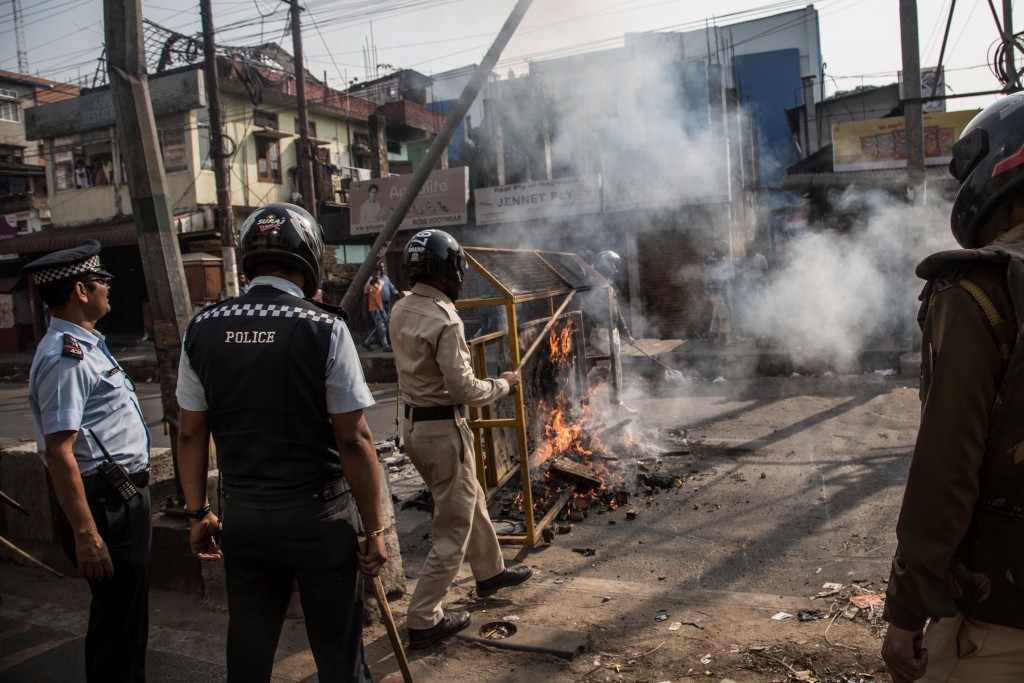
Left/Top: Indian police and Assam commandos beat a woman near Silphukuri during clashes on Dec. 12, 2019, in Guwahati, Assam in India, as thousands of people defied curfew and marched toward the heart of the city. Right/Bottom: Indian police officials remove a burning barricade on a street in Guwahati on Dec. 12, 2019. Protestors were dispersed with tear gas and stun guns.Photos: Ahmer Khan
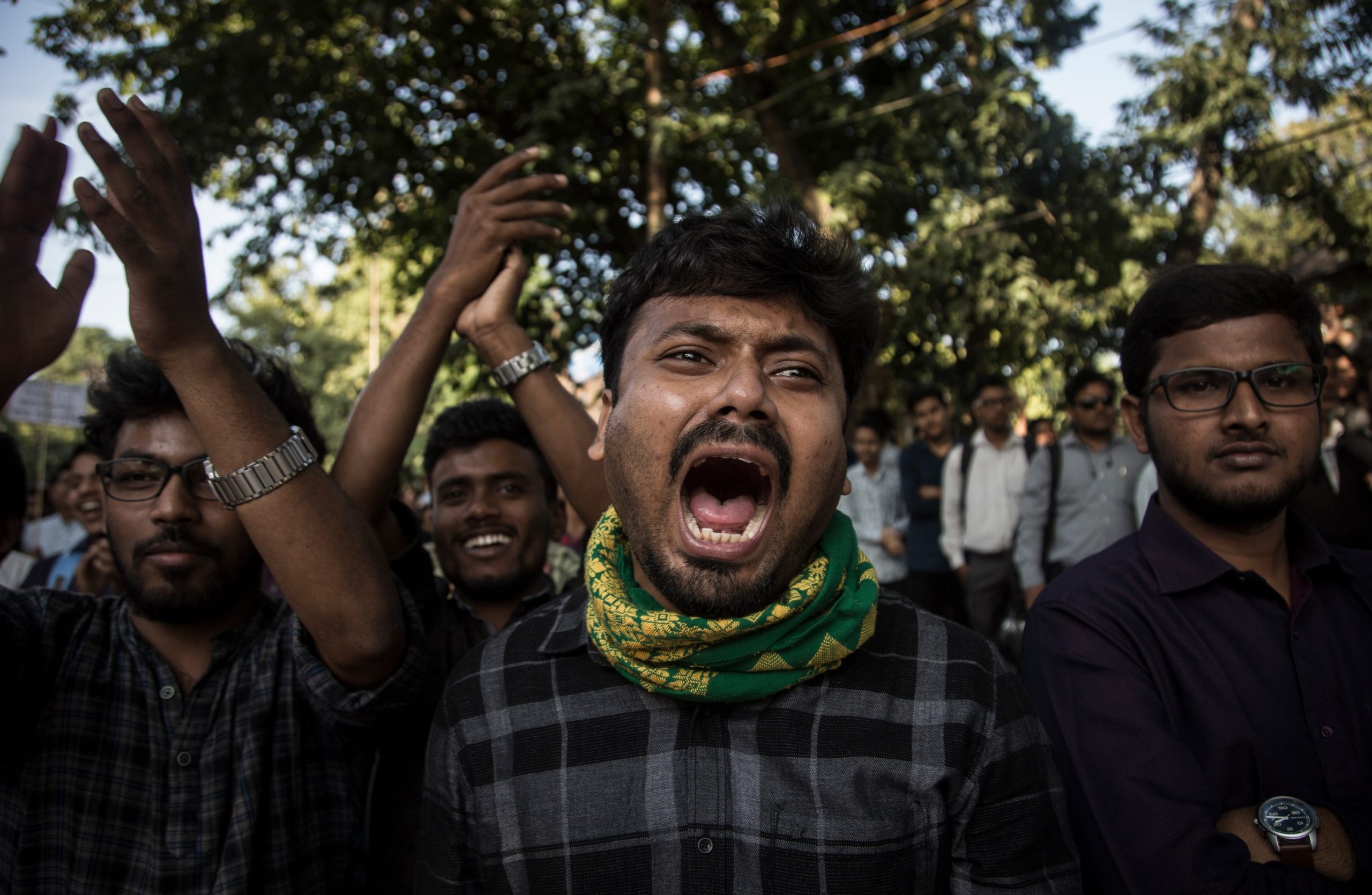
Photo: Ahmer Khan
The conditions at detention centers in Assam — where families are separated, and people are held virtually indefinitely without being fed properly or given proper medical attention — appear to violate international law, according to Harsh Mander, a former special monitor for India’s National Human Rights Commission, who visited the detention centers. He resigned in protest when the commission failed to act on the recommendations in his report.
Top BJP officials, including Modi and India’s Home Minister Amit Shah, have long promised to implement a nationwide registry similar to that in Assam. Should that happen, Mander told me, it will likely mean that those who fail to establish their Indian lineage will be “allowed” to remain in the country but without any citizenship rights. They will be “stripped of the right to vote, the right to own property, and the right to have any kind of social security,” Mander said, “but also like a marked people, who will be continuously vulnerable to violence and discrimination.”
Plans for expanding the citizenship test have also appeared in the BJP’s electoral manifestos. But the recent wave of protests may have given Modi pause. At a rally in New Delhi in December, he claimed that there are no plans for a nationwide registry. He also said there are no detention centers in India, even though they have existed for more than a decade, with much larger ones currently being built in Assam and elsewhere in the country.
In December, the BJP took another step toward creating a nationwide NRC: The Indian cabinet approved funding for a National Population Register to be carried out in 2020. Government officials have said the NPR is linked to the census and has nothing to do with the NRC, but it will include a question about parents’ birthplaces, drawing critics to believe that it will be used to identify “doubtful citizens,” who will then bear the burden of establishing their Indian lineage.
As the Modi government continues to contradict itself on its citizenship policies, a closer look at the registry in Assam helps illustrate what its expansion could mean for India’s minorities — and how the seemingly separate policies of the Citizenship Amendment Act and the registry could intersect to penalize Muslims.
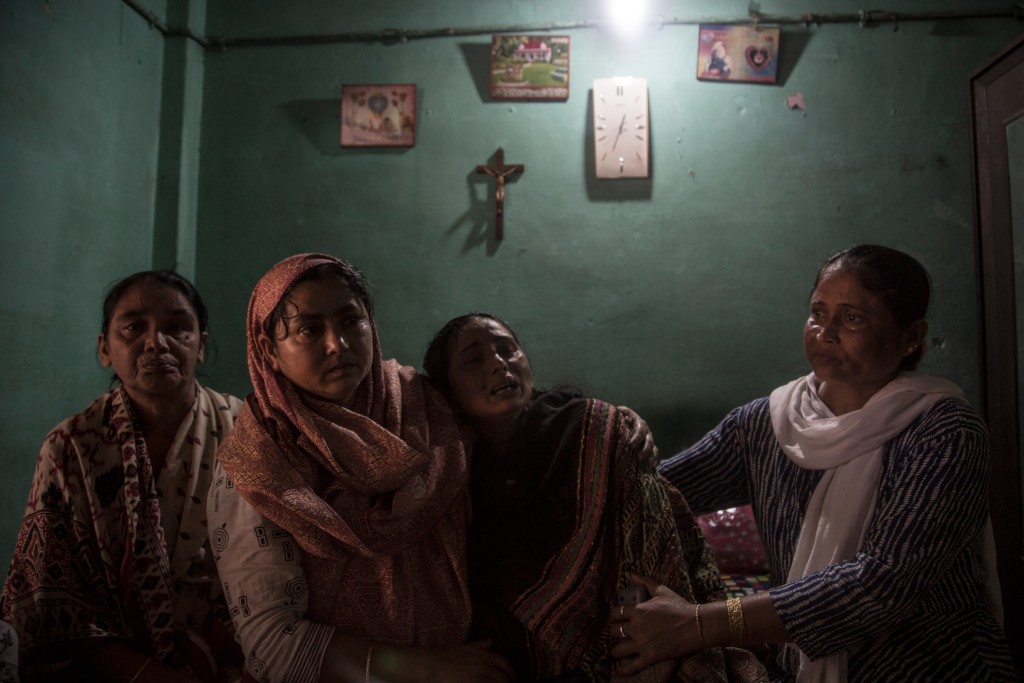
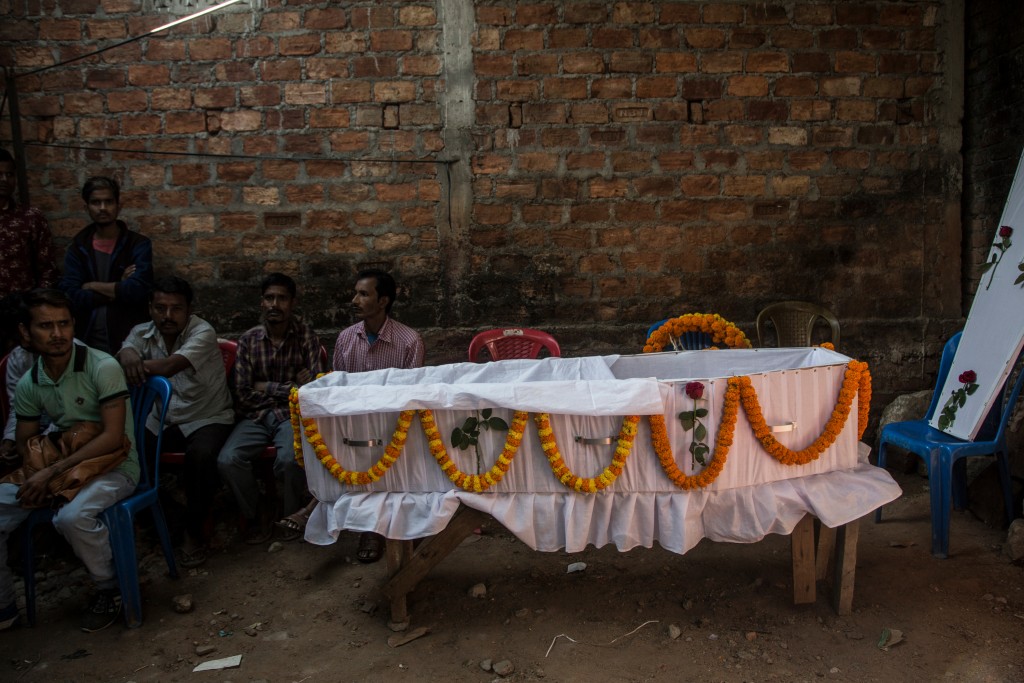
Family members console the mother of Sam Stafford, second from right, as they mourn during the funeral for the 18-year-old who was killed by police in Guwahati. Four civilians were killed in police fire during massive anti-citizenship law protests in Assam.Photos: Ahmer Khan
This migration gave rise to the so-called Assam Movement, which demanded the expulsion of those migrants. A citizenship registry became one of the movement’s key demands, as a way to identify people for deportation. In 2015, under orders from the Supreme Court, authorities in Assam proactively began using the registry to identify unauthorized immigrants. Modi had been elected prime minister a year earlier, and with the BJP’s Hindu nationalist vision ascendant in India, the largely ethno-linguistic conflict moved in a religious and sectarian direction, morphing into a tool to weed out Muslim immigrants.
Himanta Biswa Sarma, Assam’s finance minister, led the BJP’s state election campaign there in 2016, bringing the party to victory on a promise to bar Muslims of Bangladeshi origin from voting. At a recent press conference, Sarma said that detention camps in Assam would no longer hold Hindus, Buddhists, Jains, or Christians. “Regarding the other population,” he said, referring to Muslims, “it is for the court to take a call.”
“The Assam Movement before the BJP came in [was] a subnationalist movement, which was also on occasion violent, but it was not an anti-Muslim movement,” said Mander. “The BJP, on the other hand, is only opposed to the Muslim community.”
Assam is among India’s poorest states, and many residents do not have identification papers. When the NRC list of Assam’s authorized residents, which was compiled by state authorities, was released on August 31, approximately 2 million people who had been unable to produce such papers, many of them Muslim, were left off India’s citizenship rolls, exposing them to the “risk of arbitrary detention and statelessness,” according to human rights monitors. Due to multiple minor bureaucratic mistakes, like misspelled names, many Indian citizens were wrongfully excluded from the registry. The anxiety caused by the process pushed dozens to suicide.
Those excluded from the rolls can argue their cases before Foreigners Tribunals, fast-track, quasi-judicial bodies that put the burden of proof on the accused. Those who fail this test will be sent to one the Assam’s detention centers or be deported.
Meanwhile, some BJP leaders claim that many of those excluded from the registry are actually Hindus. Disenfranchising them would be political suicide for Modi’s Hindu nationalist government, which has said it would use the CAA to give citizenship to Bengali-speaking Hindus left off the citizenship rolls in Assam. As Dilip Kumar Paul, a BJP lawmaker, put it, “Our BJP’s stand is that Hindus can never be foreigners.”
The activists who spearheaded the Assam Movement, however, object to any Bangladeshi immigrants — Hindu or Muslim — being allowed to obtain citizenship. “Now, through the Citizenship Amendment Bill, the BJP government is trying to protect their illegal Hindu Bangladeshi vote bank,” said Samujjal Bhattacharya, an adviser to the All Assam Students’ Union, one of the central anti-immigrant organizations that spearheaded the Assam Movement. “We will never allow this.”
Historically, the Indian government has threatened mass deportations in Assam, but they never materialized. In the last six years, out of 129,000 Assam residents declared foreigners by the government, only four were deported to Bangladesh. More often, people accused of being in India illegally spend years in detention centers.
Even though the registry had the potential to leave millions in Assam stateless, it was zealously supported by many of the state’s residents, including many Muslim organizations. They felt that if they could establish their Indian lineage and be included in the registry, the generational harassment and accusations that they are “infiltrators” would come to an end.
“There was this huge bogey in Assam that Bangladeshis have come in and they were taking over our demography,” said Teesta Setalvard, one of India’s most prominent human rights activists who works on citizenship issues in Assam through her human rights group Citizens for Justice and Peace. “And let’s not forget that post-Partition, there is a very strong and sharp anti-Muslim undercurrent in all of this. So people in Assam, particularly the ethnic and linguistic minorities, were keen that this NRC process could once and for all settle this bogey.”
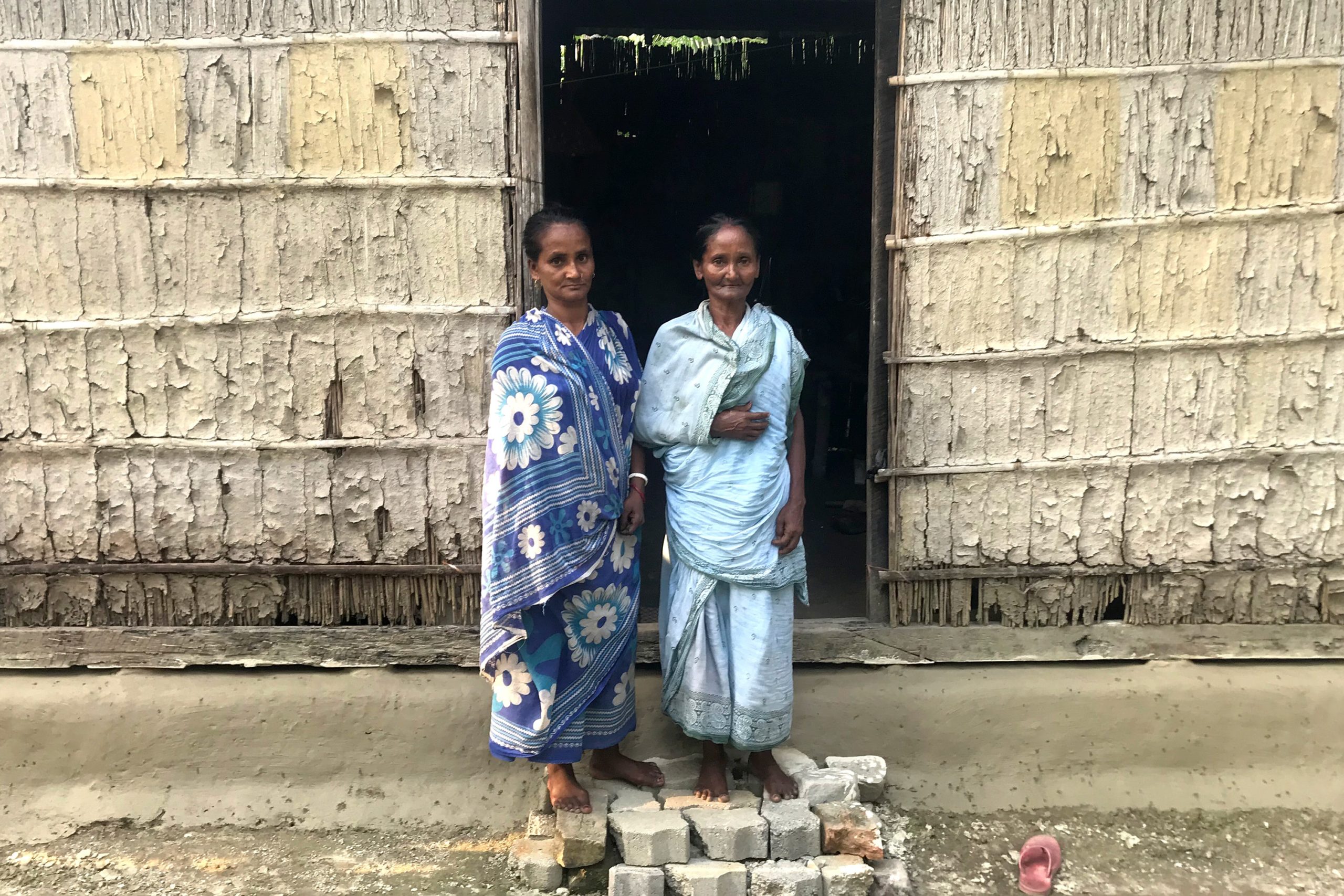
Photo: Soumya Shankar for The Intercept
The police took Mandal to a detention camp in Kokrajhar District, one of the six in Assam meant to hold “illegal immigrants.” It turned out that the authorities were convinced that she was actually Madhubala Das, who had died a few years earlier. The authorities suspected that Das had been a Bangladeshi Muslim who had entered India without authorization. For three years, Mandal, who is Hindu, fought in court to prove her identity. She was finally released from detention last June.
In Assam’s Goalpara District, which neighbors Kokrajhar and where a new detention center is being built, I met Noor Mohammad, a poor, 61-year-old Muslim paddy farmer who lives in a modest hut made of mud and straw. He was detained from his home in 2012 after being deemed a “doubtful voter” — an arbitrary state government designation for people it suspects are not genuine citizens.
For seven years, Mohammad fought in court to establish his family’s lineage. I met him at his neighbors’ home, where he and his neighbors laid out his family’s land documents dating from 1951 and 1966, as well as voter rolls that include names of his family members. According to Mohammad’s neighbors, his family settled in Assam around 1931.
Mohammed was finally released last August, seven years and six months after his arrest and a few weeks before the final citizenship registry came out. He described his time in the camp as “hellish.” He wasn’t allowed to speak to other prisoners and spent his days lying down “senselessly” in a corner. Officials routinely called him “Bangladeshi,” a slur used to demonize Muslims and characterize them as outsiders. “I’m an Indian, with all my documents, [and] this is happening to me,” he said, his face forlorn, as though he were resigned to his fate.
The day before the citizenship registry was released, I asked him if he had hopes for the future. He stared at me with consternation, put his head in his hand, and wept like a child, beating his chest and muttering, “Never again, I hope never again.” In between his sobs, he said: “I hope what has happened to me does not happen to anyone else. What sin did I commit?” His case is ongoing; he was freed after posting bail, which people suspected of being unauthorized immigrants are eligible for after three years of detention.
Mandal’s and Mohammad’s stories highlight the interplay between the citizenship registry and the CAA. If a Hindu like Mandal were to fail to prove her Indian lineage, she would be removed from the citizenship rolls — but deemed Indian under the CAA. For Muslims like Mohammad, though, exclusion from the registry would be the end of the road, even though India is the only home he’s ever known.
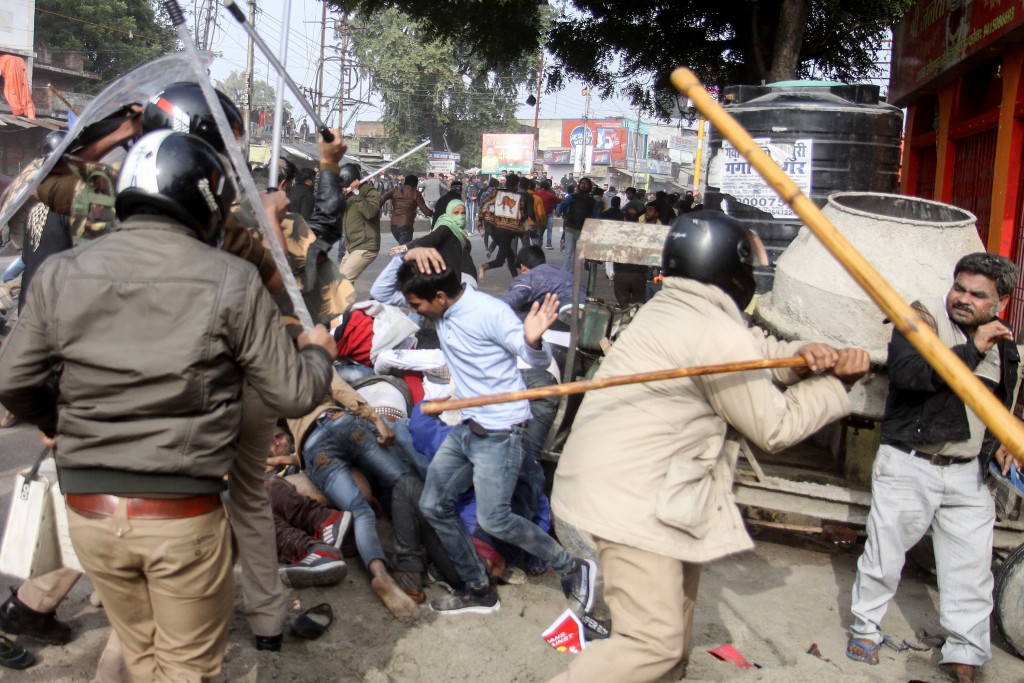
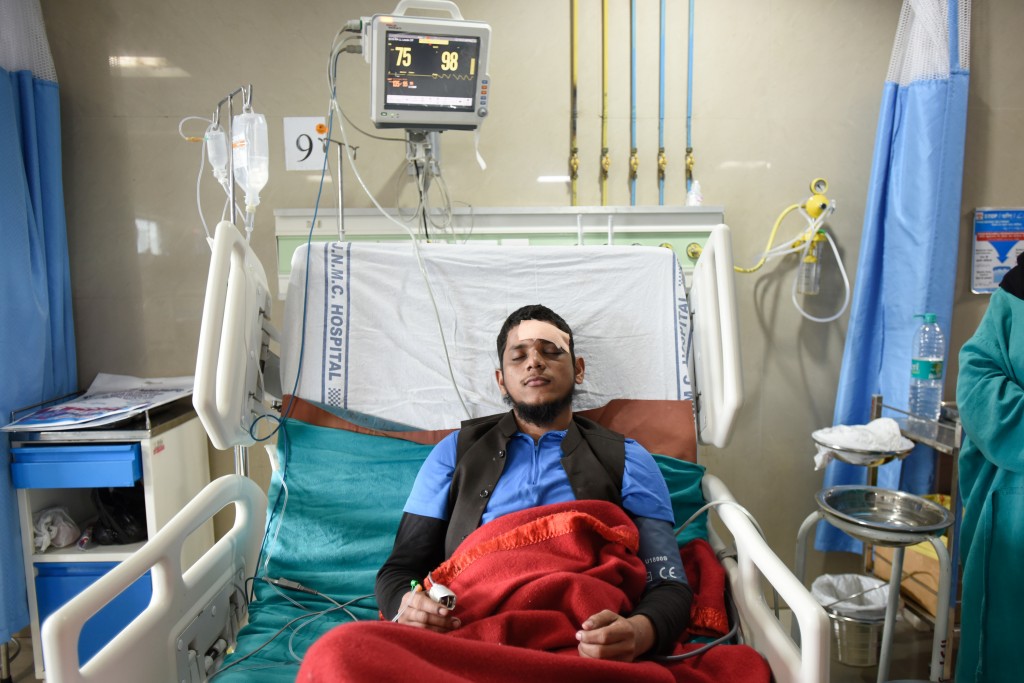
Left/Top: Police beat protesters with sticks during a demonstration against India’s new citizenship law in Lucknow on Dec. 19, 2019. Right/Bottom: An Aligarh Muslim University student, who was injured in police crackdown after a protest on Dec. 15, 2019, is admitted to the Jawaharlal Nehru Medical College on Dec. 19, 2019, in Aligarh, India.Photos: AFP via Getty Images; Burhaan Kinu/Hindustan Times via Getty Images
Over the last several weeks, the Indian government has responded to the anti-CAA protests, which have taken place in every state in the country, by invoking Section 144, a law barring public assembly, detaining and arresting thousands of protesters across the country. The government has also shut down the internet across the country, most notably in the populous state of Uttar Pradesh, which is known to have the largest concentration of Muslims in India. At an election rally in the state of Jharkhand in December, Modi singled out Muslim protesters for ridicule, saying, “The miscreants can be identified by their clothes.”
Students at Jamia Milia Islamia — a central university in Delhi with a sizable Muslim student body – were key to the resistance. The Delhi police force responded to the protesters with disproportionate force, brutalizing some students and sparking a series of marathon protests in the capital that were suppressed with batons, water cannons, mass detentions, tear gas canisters, and shelling. In early January, members of the BJP’s student affiliate, Akhil Bharatiya Vidyarthi Parishad, were involved in a violent attack at Jawaharlal Nehru University, another university in New Delhi.
Meanwhile, the state of Uttar Pradesh, where 20 percent of the population of 200 million is Muslim, has borne the brunt of the crackdown. The state government, led by Yogi Adityanath — a Hindu-nationalist monk known for his violent, Islamophobic statements — has threatened to charge around 250 protesters under the National Security Act, which empowers the state to detain anybody for an unlimited amount of time for posing a national security threat.
Other Muslim protesters have been arrested on charges of attempted murder, even as video evidence has shown police officers firing live rounds, barging into homes, destroying property, beating up children, and detaining people in Muslim-majority neighborhoods. The Indian Civil Liberties Union, a group of activists working on the ground in Uttar Pradesh, estimates that more than 5,000 people have been detained and more than 1,400 arrested in the state. Of the 28 people killed nationwide since the start of the protests, 20, including an 8-year-old child, were killed in Uttar Pradesh by Adityanath’s police force.
Protesters across India have made opposition to the national citizenship registry part of their resistance to the Modi regime. At multiple protest sites in New Delhi, I saw protestors holding banners that read, “Hum Kagaz Nahi Dikhayenge,” or “We will not show our papers,” a phrase from a protest song penned in anticipation of a nationwide registry.